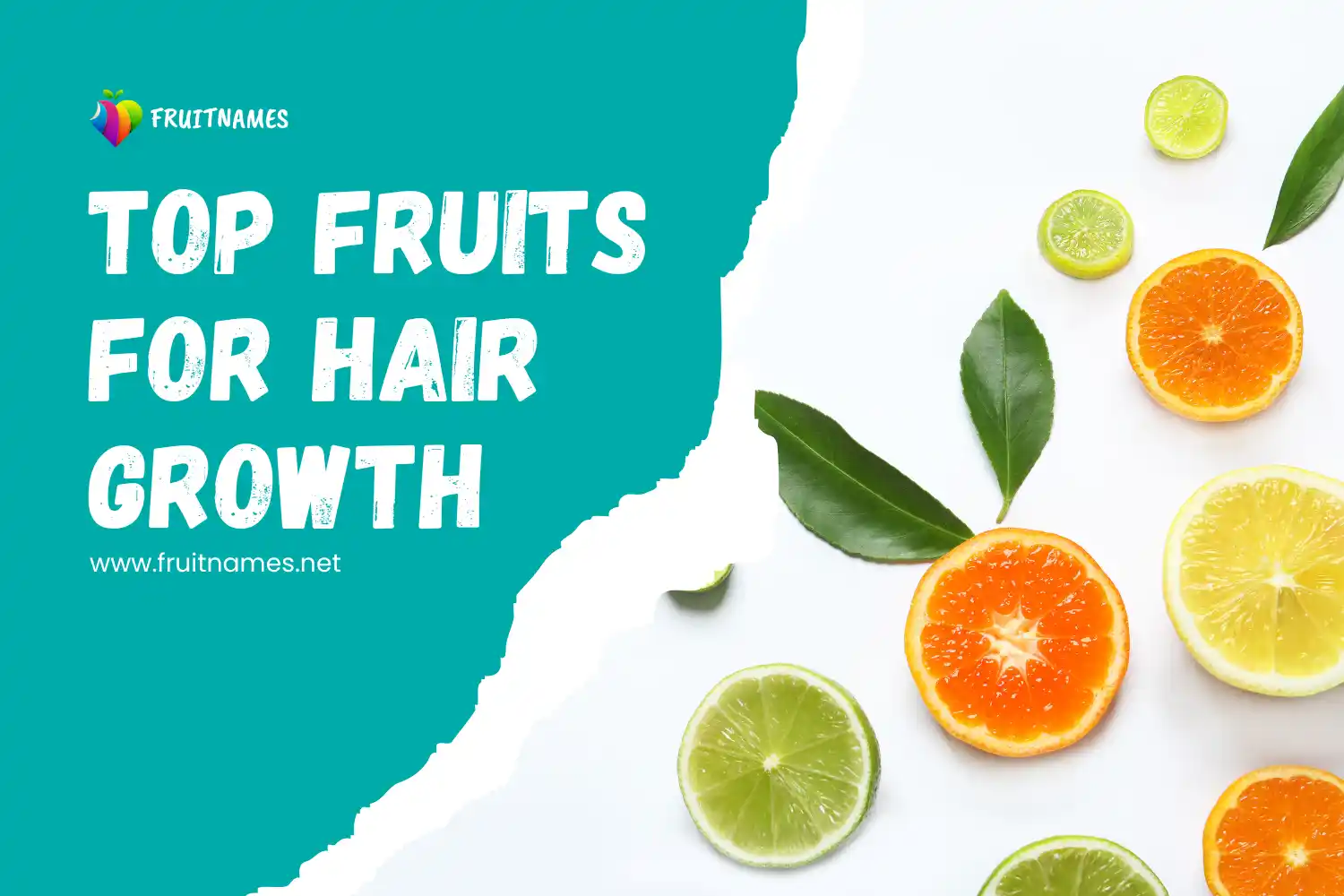This comprehensive guide will delve into various fruits names that can transform your hair care routine. Fruits for Hair Growth From combating hair loss to enhancing texture and shine, these fruits are nature’s answer to achieving the tresses of your dreams. Whether you’re dealing with dullness, breakage, or just looking to boost your mane’s resilience, the solutions are a bite away.
Join us on this fruity exploration, where we’ll uncover the science behind each fruit’s hair-boosting properties and provide practical tips on incorporating them into your diet for maximum impact. Say goodbye to lack lustre hair days and embrace the natural power of fruits to nourish your strands from the inside out. Get ready to discover a delicious path to healthier, more beautiful hair!
What is the effect of nutritional deficiency on hair?
Nutritional deficiencies can have a significant impact on the health of your hair. Here are some effects of specific nutrient deficiencies on hair:
1. Protein Deficiency:
- Effect: Insufficient protein intake can lead to weakened hair structure, causing hair to become brittle and more prone to breakage. Severe protein deficiency may even result in hair loss.
2. Iron Deficiency (Anemia):
- Effect: Anemia, often caused by a lack of iron, can reduce oxygen supply to hair follicles. This can result in slow or halted hair growth and, in severe cases, hair loss.
3. Vitamin D Deficiency:
- Effect: Vitamin D is crucial for hair follicle stimulation. Deficiency may contribute to hair thinning and an increased risk of alopecia (hair loss).
4. Vitamin A Deficiency:
- Effect: While vitamin A is essential for hair health, excessive intake or deficiency can lead to hair loss. Striking the right balance is crucial.
5. Vitamin E Deficiency:
- Effect: Vitamin E plays a role in maintaining healthy scalp circulation. Deficiency may contribute to poor blood flow, affecting hair growth.
6. Biotin Deficiency (Vitamin B7):
- Effect: Biotin is often associated with hair health. A deficiency may result in hair thinning, loss, and brittle nails.
7. Omega-3 Fatty Acid Deficiency:
- Effect: Omega-3 fatty acids contribute to scalp health. Their deficiency may lead to dry scalp, dull hair, and increased hair breakage.
8. Zinc Deficiency:
- Effect: Zinc is crucial for hair tissue growth and repair. Deficiency can lead to weakened hair structure and hair loss.
9. Copper Deficiency:
- Effect: Copper is involved in melanin production, and its deficiency may lead to premature greying of hair.
10. Folic Acid (Vitamin B9) Deficiency:
- Effect: Folic acid, including hair follicle cells, is essential for cell division. Deficiency can contribute to hair thinning and loss.
Can Fruits Be Beneficial In Hair Growth?
Yes, fruits can benefit hair growth due to their rich content of vitamins, minerals, antioxidants, and other nutrients that support overall hair health. Here are several ways in which fruits contribute to promoting hair growth:
- Vitamins and Antioxidants: Fruits such as berries, citrus fruits, and kiwi contain vitamins (especially vitamin C) and antioxidants. These nutrients help combat oxidative stress, which can contribute to hair damage and promote a healthier scalp environment for optimal hair growth.
- Collagen Synthesis: Fruits like kiwi contain vitamin C, essential for collagen synthesis. Collagen is a structural protein that contributes to the strength and elasticity of hair strands, promoting overall hair health.
- Biotin Boost: Biotin, also known as vitamin B7, is crucial for hair growth, and certain fruits like strawberries contain this essential nutrient. Biotin helps produce keratin, a protein that forms the foundation of hair.
- Healthy Fats: Avocado, a fruit rich in healthy fats, nourishes the hair and scalp. These fats contribute to moisture retention, preventing dryness and promoting a healthy environment for hair growth.
- Enzymatic Support: Fruits like papaya contain enzymes, such as papain, which may aid in the breakdown of proteins and contribute to overall hair repair and rejuvenation.
- Iron Absorption: Vitamin C-rich fruits can enhance the absorption of non-heme iron (plant-based iron) from other foods. Iron is essential for proper blood circulation, supporting oxygen and nutrient delivery to the hair follicles.
- Promoting Scalp Health: The vitamins and minerals found in fruits contribute to a healthy scalp. A well-nourished scalp is crucial for preventing dandruff and maintaining an environment conducive to hair growth.
- Reducing Inflammation: Some fruits, such as pineapples, contain bromelain, an enzyme with anti-inflammatory properties. Reducing inflammation on the scalp may contribute to a healthier environment for hair growth.
What Are The Best 20 Fruits For Your Hair?
A diverse and balanced diet that includes a variety of fruits can contribute to the overall health of your hair. Here’s a list of 20 fruits that are known for their potential benefits to hair health:
- Bananas: Rich in potassium, which strengthens hair and prevents breakage.
- Berries (Strawberries, Blueberries, Raspberries): Packed with antioxidants that promote overall hair health and growth.
- Citrus Fruits (Oranges, Grapefruits, Lemons): High in vitamin C, supporting collagen production and a healthy scalp.
- Avocado: Contains healthy fats that nourish and moisturise hair for a natural shine.
- Kiwi: Rich in vitamin C for collagen synthesis, promoting hair strength and elasticity.
- Papaya: Enzymes like papain contribute to hair repair and rejuvenation.
- Mango: Provides vitamin A, supporting sebum production for a moisturised scalp.
- Pineapple: Contains bromelain, which may reduce hair loss and inflammation.
- Grapes: Packed with antioxidants that contribute to hair resilience and protection.
- Apples: Contain vitamins and antioxidants that support overall scalp health.
- Pears: Provide vitamins and hydration for a healthy scalp.
- Cherries: Rich in antioxidants that help combat oxidative stress on the hair.
- Watermelon: Hydrating and contains vitamins A and C for scalp health.
- Guava: High in vitamin C and other nutrients for hair growth.
- Pomegranate: Contains antioxidants that promote blood circulation to the scalp.
- Cantaloupe: Rich in vitamins A and C, supporting hair health.
- Plums: Provide vitamins and minerals essential for hair growth.
- Apricots: Contain vitamins A and E, contributing to overall hair health.
- Peaches: Rich in vitamins and minerals that support hair strength.
- Dragon Fruit: Packed with vitamin C and antioxidants for hair vitality.
Suitable Fruits For Every Ayurvedic Constitution
In Ayurveda, the traditional system of medicine in India, individuals are categorised into three primary constitutions or doshas: Vata, Pitta, and Kapha. Each dosha has its characteristics, and Ayurveda recommends specific dietary guidelines to balance and support each body. Here are fruits that are generally considered suitable for each dosha:
- Vata Constitution: Vata is associated with dryness, coldness, and mobility. To balance Vata, focus on warm, moist, and grounding fruits.
- Bananas: Calming and nourishing for the nervous system.
- Avocado: Rich in healthy fats, providing grounding energy.
- Mango: Sweet and juicy, helps balance Vata’s dryness.
- Berries (especially cooked): Moist and antioxidant-rich.
- Papaya: Easy to digest and soothing for Vata.
- Peaches: Moistening and calming.
- Pitta Constitution: Pitta is associated with qualities like heat, intensity, and acidity. To balance Pitta, focus on cooling and hydrating fruits.
- Sweet Grapes: Cooling and hydrating for Pitta.
- Watermelon: High water content helps cool the body.
- Coconut: Cooling and soothing for the digestive system.
- Sweet Apples: Less acidic and balanced for Pitta.
- Pears: Cooling and mild for the digestive system.
- Melons (except for sour varieties): Cooling and hydrating.
- Kapha Constitution: Kapha is associated with heaviness, coldness, and stability. To balance Kapha, focus on warm, light, and dry fruits.
- Berries (especially tart): Light and less sweet, suitable for Kapha.
- Pomegranate: Astringent and helps balance Kapha’s heaviness.
- Apples (especially tart): Light and digestive.
- Pears (especially firm): Less sweet and lighter for Kapha.
- Apricots: Drying and balancing for Kapha.
- Cranberries: Tart and astringent, suitable for Kapha.
Conclusion
Aligning our dietary choices with the principles of Ayurveda offers a personalised and holistic approach to well-being, considering the unique characteristics of each individual’s constitution or dosha. The recommended fruits for Vata, Pitta, and Kapha constitutions play a vital role in maintaining balance and harmony within the body.
By incorporating these fruits into our daily diet, we can leverage their inherent qualities to alleviate or enhance specific doshas, promoting overall health and vitality. Ayurveda’s wisdom extends beyond mere nutrition; it encompasses a lifestyle that harmonises the mind, body, and spirit.
FAQ’s
What are Ayurvedic constitutions or doshas?
Ayurvedic constitutions, or doshas, are Vata, Pitta, and Kapha, representing unique combinations of the five elements (earth, water, fire, air, and space) that influence an individual’s physical and mental characteristics.
How can I determine my Ayurvedic constitution?
Consulting with an Ayurvedic practitioner is the most accurate way to determine your constitution. They may use various assessments, including lifestyle and dietary habits, to identify your dominant dosha.
What role do fruits play in Ayurvedic balancing?
Fruits must balance or pacify specific doshas based on their inherent qualities. They contribute to overall health and well-being by addressing the unique needs of each constitution.
Can I eat fruits that are not recommended for my dosha?
In moderation, yes. Ayurveda allows for flexibility, and the occasional consumption of fruits outside your recommended list may not cause significant imbalance. However, it’s advisable to focus on dosha-specific fruits primarily.
Are there fruits that are generally beneficial for all doshas?
Certain fruits, such as sweet and ripe fruits like bananas and sweet apples, are often considered tridoshic and suitable for all doshas in moderation.
How should fruits be consumed to maximise their benefits?
Eating fruits ripe, in their natural season, and in a way that supports your dosha balance is recommended. For instance, Vata individuals may benefit from warming fruits, while Pitta prefers cooling options.
Can Ayurvedic principles help with specific hair concerns?
Ayurvedic principles, including dietary recommendations, can contribute to overall hair health. For personalised advice, consulting an Ayurvedic practitioner is recommended.
Are there fruits to avoid for specific doshas?
While Ayurveda emphasises moderation, individuals with specific imbalances may be advised to limit or avoid certain fruits. Consultation with an Ayurvedic practitioner can provide tailored guidance.
How do seasonal changes affect fruit recommendations?
Ayurveda considers seasonal variations in recommending fruits. For example, cooling fruits may be more suitable during hot summers, while warming fruits may be preferred in colder months.
Can Ayurvedic fruit recommendations change with age?
Yes, the balance of doshas can shift with age, influencing dietary needs. Regular check-ins with an Ayurvedic practitioner can help adjust your diet as needed.
What is the significance of the taste of fruits in Ayurveda?
Ayurveda recognises six tastes: sweet, sour, salty, bitter, spicy, and astringent. Including various flavours in your diet helps ensure a balanced and satisfying meal.
Are there Ayurvedic guidelines for fruit combining?
Ayurveda suggests mindful food combining to support digestion. Generally, it’s advised to avoid combining fruits with heavy proteins and to eat them separately.
Can Ayurvedic principles help with digestive issues related to fruit consumption?
Ayurveda provides insights into enhancing digestive fire (Agni) to optimise nutrient absorption. This may involve specific practices or herbs recommended by an Ayurvedic practitioner.
Is it necessary to strictly adhere to Ayurvedic fruit recommendations?
While Ayurvedic guidelines offer valuable insights, listening to your body is essential. If you have specific health concerns or dietary restrictions, consult an Ayurvedic practitioner for personalised advice that aligns with your needs.

Balaji KVR, a passionate botanist and plant enthusiast with a strong academic background in plant biology. My journey at Botany Lane Greenhouse has been nothing short of exhilarating. Here, I delve deep into the world of plants, conducting extensive research, identifying unique species, and ensuring their optimal growth.
My expertise extends to propagation techniques, disease management, and meticulous plant care. I’m dedicated to creating the perfect environment for plants, focusing on maintaining precise conditions and utilizing innovative methods. Beyond my green endeavors, I actively engage in educational initiatives, workshops, and tours, aiming to foster a deeper understanding and love for the fascinating botanical realm.


